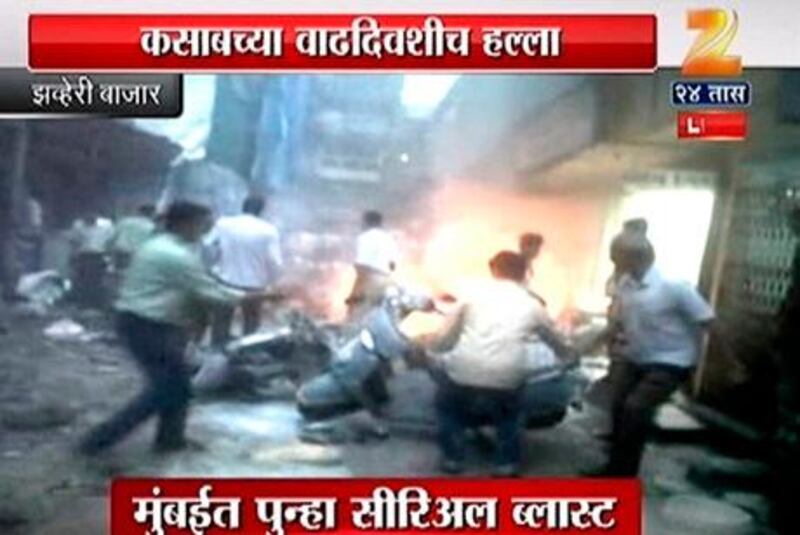Mumbai was rocked this evening by three rush-hour explosions in busy areas that killed at least 17 people and injured many dozens.
Initial reports suggested one explosion each occurred in Zaveri Bazaar, Opera House and at a bus stop in Dadar, all pockets in the southern suburbs of the city and minutes away from each other. The first blast happened at 6.54pm Indian time at Zaveri Bazaar. The Dadar blast was next at 6.55pm and the Opera House saw the most powerful of the three at 7.04pm.
Aagam Doshi, a witness of the blast at the Opera House and a diamond merchant in south Mumbai, said: "We heard a big blast. The building shook, the windows shattered. It was deafening.
"We came outside, and the area was filled with black smoke. There were bodies lying all over the street, there was lots of blood. We saw many bodies missing arms and missing legs."
The BBC initially reported that the explosions have come on the birthday of Mohammad Ajmal Amir Qasab, the only survivor of 10 Islamist militants who laid siege to the city, killing 166 people, in 2008. However, this was subsequently denied by Mumbai police, who asked the media to stop spreading the rumour as it was "stoking up the passions".
No group has claimed responsibility but the Home Ministry officials, in charge of security matters, said that the attacks look the handiwork of Indian Mujahideen and were a "terror strike" involving improvised explosive devices (IEDs).
The scale of the explosions have been much less than previous bombings in the city, the commercial capital of India and a frequent target for terrorists.
The three locations and the timing of the attack to coincide with the office rush hour traffic underlined the meticulous planning of the strike that comes just over a month before the country will celebrate its Independence day.
Chaggan Bhujbal, a state minister, said: "It is clear that that the attackers wanted to hurt as many people as possible. Many people are injured."
At least 81 people were wounded, Prithviraj Chavan, the chief minister of the state of Maharashtra, told CNN-IBN.
"The vehicles used [in the attacks] were scooters and motorcycles," he said.
Television channels also said an improvised explosive device was placed in a car, suggesting the work of local groups rather than an international terror network.
Television images showed blaring ambulances carrying away the injured at one of the attack sites. At Dadar in central Mumbai, one of the explosions left car windows shattered and uprooted electric poles.
Police were seen using sniffer digs to look for clues while local people helped paramedics carry away some of the injured.
The minister also stressed that there was no further bomb or threat perceivable amid reports that one more unexploded bomb was found.
All three locations are synonymous with the business community, especially textile and jewellery industries. Zaveri Bazaar has been a target for blasts in the pasts, including 1993, when serial bomb attacks killed at least 260 people at the stock exchange and other areas. Opera House is a district in south Mumbai famous for food stalls and a favourite destination for many office-goers.
After the terrorist attack on the city in 2008, crack units of a specially created agency, the National Security Agency, were formed with hubs in Mumbai, New Delhi and Hyderabad. In addition, a team from the National Investigativ Agency have been deployed.
For expatriates looking for news on relatives the Mumbai police control room numbers are (+91) 22 22621855, 22 22621983 and 22 22625020.





